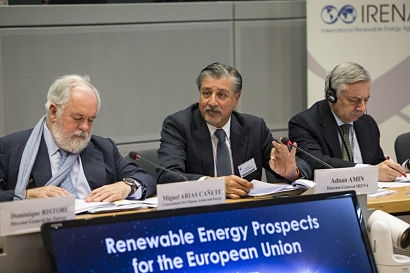
The report - ‘Renewable Energy Prospects for the European Union’– was launched in Brussels by IRENA’s Director-General Mr. Adnan Z. Amin, who commented that achieving higher shares of renewable energy is possible with current technology, triggering additional investments of €368 billion ($454 billion) until 2030, equivalent to an average annual contribution of 0.3 percent of EU GDP. The number of people employed in the sector, currently 1.2 million, would also grow under a revised strategy.
The increase in renewable energy installation would also reduce emissions by a further 15 percent by 2030, equivalent to Italy’s total emissions. This would bring the EU into line with its goal to reduce emissions by 40 percent compared to 1990 levels, setting it on a positive pathway to longer term decarbonisation. It would also generate savings of between 44 billion and 113 billion euros per year by 2030, when accounting for savings related to the cost of energy and avoided environmental and health costs.
“For decades now, through ambitious long-term targets and strong policy measures, Europe has been at the forefront of global renewable energy deployment” said IRENA Director-General Adnan Z. Amin. “With an ambitious and achievable new renewable energy strategy, the EU can deliver market certainty to investors and developers, strengthen economic activity, grow jobs, improve health and put the EU on a stronger decarbonisation pathway in line with its climate objectives.”
Miguel Arias Cañete, European Commissioner for Energy and Climate Action, added that the report confirms assessments that the cost of renewables have come down significantly in the last couple of years and that the EU needs to consider these new realities in its ambitions for forthcoming negotiations to finalise European renewable energy policies.
The report highlights that all EU Member States have additional cost-effective renewable energy potential, noting that renewable heating and cooling options account for more than one-third of the EU’s additional renewables potential. Furthermore, all renewable transport options will be needed to realise EU's long-term decarbonisation objectives.
The report is a contribution to the ongoing discussions on the European Commission’s ‘Clean Energy for All Europeans’ package, tabled in November 2016, which proposed a framework to support renewable energy deployment. It is also part of IRENA’s renewable energy roadmap, REmap, which determines the potential for countries, regions and the world to scale up renewables to ensure an affordable and sustainable energy future.
Image: IRENA Director-General Mr. Adnan Z. Amin presenting the report in Brussels
For additional information:

